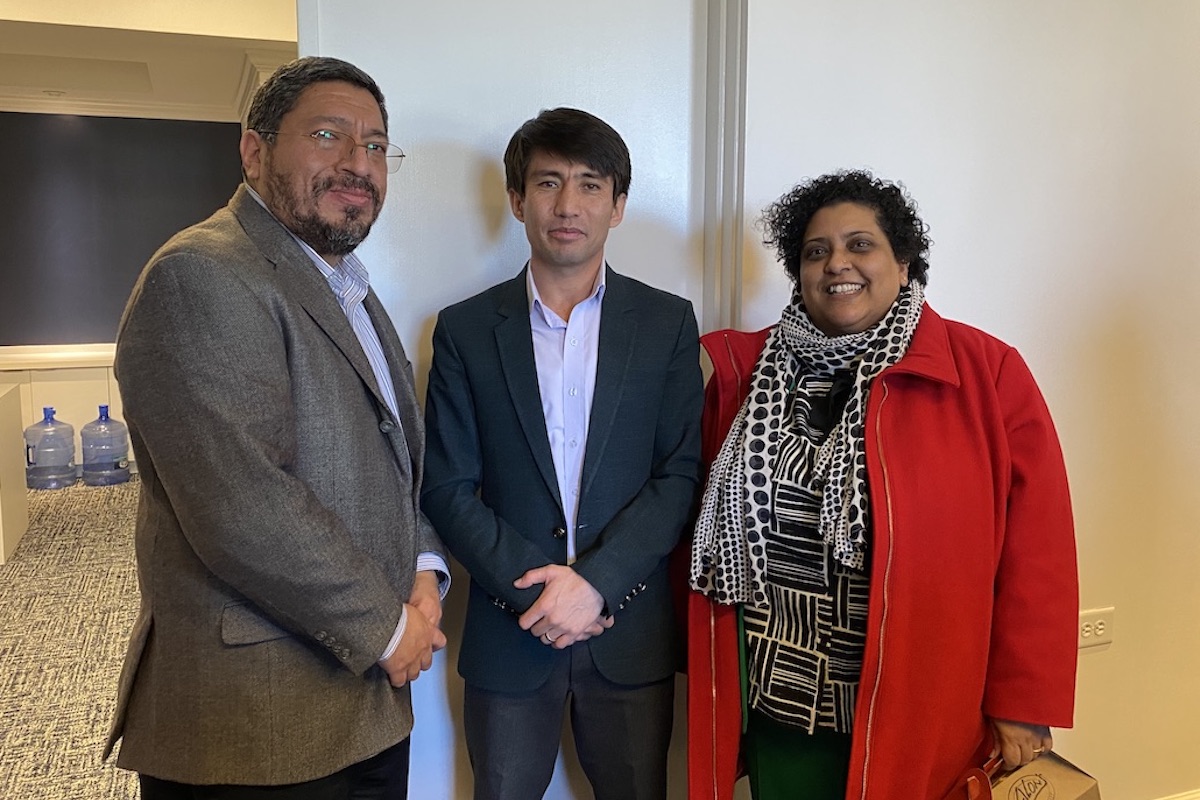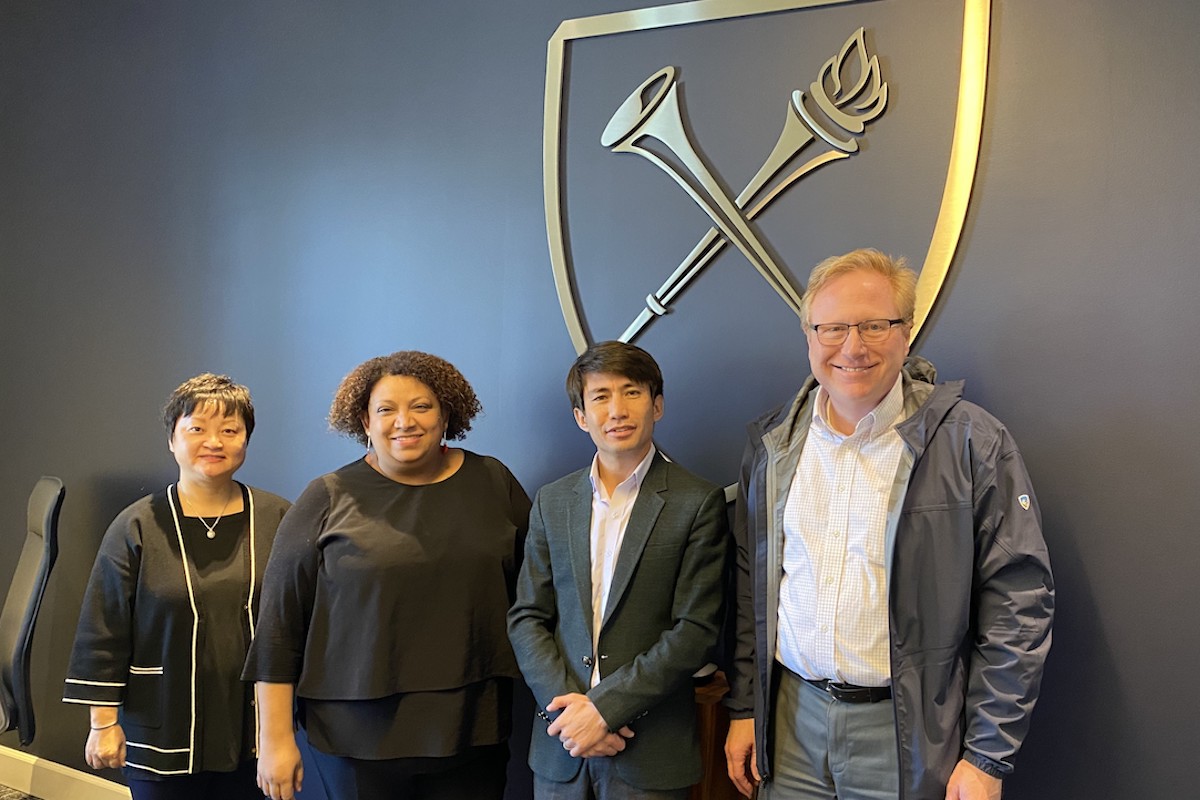Going to the Kabul airport was very hard and scary. But we were lucky.
His successful, though extremely stressful, departure from his native country comes through the intercession of Scholars at Risk and a number of staff and faculty at Emory, including what is now his academic home, the Department of Economics.
Scholars at Risk is an international network of institutions and individuals dedicated to protecting scholars and promoting academic freedom. It arranges academic positions at member universities and colleges for, as their website indicates, “scholars facing grave threats, so their ideas are not lost and they can keep working until conditions improve and they are able to return to their home countries.”
David Jacho-Chávez, professor of economics and director of graduate studies, notes that the department learned about the efforts of Scholars at Risk for the first time through Emory’s Faculty Senate in May 2022. The university had joined Scholars at Risk with the idea of potentially identifying a faculty member to bring here but proved open to welcoming Fidakar as someone with faculty experience looking to complete his doctorate.
The Scholars at Risk report plainly states the danger that Fidakar — along with his wife, Basira Bahar, and their then-three-year-old-daughter Baran — was experiencing:
This scholar reports facing high and direct risk due to his criticism of the Taliban in his university lectures, which were recorded and given to the Taliban. He reports that several months ago, national security agents warned him of potential direct threats by the Taliban. In late July [2021], the Taliban reportedly fired guns at his home, leaving it “riddled with a hail of bullets.” Afterward, they reportedly entered his home and burned all his books and documents. In addition, the scholar fears that his advocacy for human rights, support of female students and teaching of economic development theory, which he notes is seen as Western ideology, may further exacerbate his risk of being targeted by the Taliban. |
Understanding how the situation came to this point is important — and not just for Fidakar.
Fidakar’s family — who come from central Afghanistan — are Hazara, one of the country’s four ethnic groups, which also include Pashtuns, Tajik and Uzbek. The Taliban are Pashtun and have exacted violence against, and repression of, the other groups, especially the Hazara.
But the suffering of his people, says Fidakar, dates back more than a century to the reign of Abdur Rahman Khan, emir of Afghanistan from 1880-1901. In that period, more than 60% of the Hazara population was massacred.
“This is not only my story,” Fidakar maintains. “This is about every individual still in Afghanistan. They are in a very difficult situation. It is also the story of the many people who have been displaced and left the country. We need the world, and especially the academy, to know what is going on. This is the narrative of all those who don’t have a narrator.”
Hailing from a family of educators
Fidakar’s father was able to complete the first year of a baccalaureate program before conditions made it impossible for him to continue; his mother did not receive a formal education.
For his part, Fidakar was admitted to Balkh University to study economics. However, given the economic stresses on his family, he requested a deferment, working as a math tutor for a year to help support a brother and sister who were pursuing their bachelor’s degrees. Fidakar graduated with a bachelor's of economics in 2013.
Equally concerned with the welfare of his wider community, Fidakar became a founding member in 2014 of the Participatory Democracy Institution for Afghanistan, which was trying to increase public awareness of the value of advocating for true representatives at the local level.
He also volunteered with the Afghan Red Crescent Society and became chief director of the BNM Library and Study Center, a public library he founded with two friends, collecting 2,000 books and enabling study groups, including for women.
From 2015-17, Fidakar taught at Muslim Private University, where he won the Excellence Award reserved for the institution’s best lecturer. In 2017, he opted to pursue a master’s of development practice at the KDI School of Public Policy and Management in South Korea. His thesis, titled “The Impact of Maternal Education on Maternal Health Seeking Behavior in Afghanistan,” argued for compulsory schooling and called on his government to provide that education without cost.
Fidakar became a lecturer at Ghazni University — located in southern Afghanistan, about two hours from Kabul — in 2014, was promoted to assistant professor of economics in 2018 and chosen to head the university’s research center in 2020.
Like Fidakar, his five siblings are highly educated. His three sisters have earned bachelor’s degrees in history, literature and philosophy, collectively. One brother has a master’s degree in electrical engineering following study in India; the other is pursuing computer science in Sweden.
“This level of education is not only true of our family; it is very common among the Hazara. They are eager to send their daughters to universities,” says Fidakar, whose advocacy for women’s educational rights is one aspect of the surveillance and intimidation he endured from the Taliban.

Administrators such as David Jacho-Chávez (left), professor of economics and director of graduate studies, and Deboleena Roy (right), senior associate dean of faculty in Emory College, made the path to Emory smoother for Fidakar to begin his doctoral work.
Running afoul of the Taliban
Among the courses he taught at Ghazni University were History of Economic Thought and Development Economics Theory. Though most of the material revolved around Western theories, Fidakar also talked about barriers to development and gave examples related to Afghanistan.
“I was trying to say to my students that we need to support our government, not the Taliban,” Fidakar notes. He made it clear that their freedoms, including their freedom to be educated at the university, depended upon it.
This fact did not sit well with his students, almost 70% of whom were pro-Taliban.
“Some of my students who were very religious recorded me,” he says. The students took this recording to the theology department. The faculty there, displeased with what they heard, intended to write a letter of protest to the economics department and to have him apologize to the class.
More worrying still, the Taliban had started to be in direct touch with Fidakar. “The first time it happened,” he recalls, “I wondered if my friends were joking with me. A few seconds into that first call, I realized it was serious and was getting afraid.”
Over the course of several conversations initiated by the Taliban, Fidakar was accused of “anti-Islamic and anti-Taliban activities at the university.” One caller made the threat explicit, saying: “You are encouraging students against the Taliban. We will find you.”
He switched off his phone, moved his family and changed his daily schedule.
Meanwhile, conditions in Ghazni were increasingly concerning. His house was in the crossfire at night when the government and Taliban would exchange gunfire. Then one evening, the shots were directed at his house.
The next morning, Fidakar moved his family to Kabul, where they lived with his parents. After leaving, they got a report that the windows in the house were riddled with bullets and all his books had been burned. Soon thereafter, the city fell to the Taliban.
His former students called him in Kabul, trying to get his new address. He and his family spent three months in hiding. At that point, the Taliban started doing house-to-house checks under the pretense of looking for guns. In truth, the search was for people who had crossed the Taliban.
Trying to keep hope alive
A friend in Turkey sent him what turned out to be a lifeline — a link to apply for the Scholars at Risk program. After a few months, the program found a doctoral opportunity for him in the U.K., but he could not get out of the country. All the borders were closed.
Fidakar relocated to Iran, which is where his interview with Emory’s economics department took place in May 2022. Despite the immense pressures on him, he made a favorable impression, according to Jacho-Chávez.
“We encountered a well-spoken economist who was trying to support his family while in hiding doing academic translations into English. As a former economics instructor in Afghanistan, his interest in development economics was obvious,” says Jacho-Chávez. “His life experiences, his current interests in refugee economics, as well as his commitment to the education of women in his country, are strengths that resonated with our department’s doctoral program community.”
With interest high on both sides, the question became: how to get him and his family safely to Emory?
Fidakar unsuccessfully sought visas to the U.S. from embassies in several neighboring countries. Though the process proved cumbersome and expensive, the U.S. embassy in Pakistan would issue him a visa. However, he could not go there directly from Iran. More circuitously — and more dangerously — he would have to go back to Afghanistan to get to Pakistan.
Despite the difficulty for his wife in traveling without a male companion, they reunited in Iran during the last month of his stay there. Together, they would need to reenter Afghanistan en route to Pakistan. “As we approached the Afghanistan border, I feared that Iranian soldiers would turn us over to the Taliban,” he says.

(L to R) Shinn Ko, assistant vice provost, International Student and Scholar Services; Obse Ababiya, associate director, Emory Global; and Philip Wainwright, now-retired vice provost for Emory Global played key coordinating roles in bringing Fidakar to Emory.
Coming to Emory
Bringing Fidakar and his family here took a village. The economics department worked directly with leadership in the Office of Global Strategy and Initiatives (GSI), Laney Graduate School, Emory College of Arts and Sciences, International Student and Scholar Services, as well as the Department of Mathematics.
“Once the decision was made to admit Mohammad into our doctoral program, all different units worked together with a great sense of urgency and empathy toward welcoming him and his family to the safety of our Emory community,” says Jacho-Chávez.
Faculty, staff and current graduate students enthusiastically pitched in — picking Fidakar and his family up at the airport, securing living space for them, donating furniture, arranging English lessons for his wife, helping enroll his daughter in school and providing her with toys.
With the memory of their harrowing journey so recent, Fidakar acknowledges “the many ways that the economics department supported us, especially from a psychological standpoint.” Renee Sevey-Hasterok, the Department of Economics’ graduate program coordinator, and her husband Rod were there at every turn to ease the burden.
Another person who pulled out all the stops to make the family feel at home is Obse Ababiya, associate director of GSI. When the family first arrived, they were at Emory’s Clairmont campus; however, with Fidakar putting in long days and evenings of study, the strain on everyone was palpable. “Obse helped us find a place even closer so that I can see my family during the day,” he says.
Ababiya credits Philip Wainwright, then the vice provost for GSI, now retired, with being “the global glue” that helped make this complicated undertaking work. She is grateful that GSI “encourages Emory to take an active role in addressing the global refugee crisis in Atlanta and abroad.”
For her part, she says, “Welcoming Mohammad to Atlanta and Emory was a dream come true and a process that took more than a year. Having him and his family strengthens the university, bringing perspectives that our community would not get otherwise.”
The mathematics department enrolled Fidakar in classes to better prepare him for the doctoral work ahead. As Jacho-Chávez comments, “Mohammad had to adapt to Emory’s academic rigor and the high standards we ask of ourselves and our students. He is a quick learner with an impressive work ethic who you can find at his desk before anyone arrives in the office and until late at night after most have left.”
The man who “loves being a teacher” and hopes to rejoin the professoriate in the future is planning, during his study at Emory, to pursue research on the economic consequences of gender discrimination in Afghanistan.
Letting in the light
And what of his home country?
According to the World Bank, people in Afghanistan are not able to meet their basic needs for food, water and shelter. Scores of men have been killed, making many women now the breadwinners. Yet, ironically, they are not allowed to work. Fidakar’s own sisters can neither work nor study. There are secret schools underground.

Fidakar enjoyed tending plants in his native Afghanistan. His daughter, Baran, shares her father’s love of helping things grow.
Though it may be the least of his losses, he left 50 plants behind when he left his home in Ghazni.
“Even now, when I remember, it makes me very sad. I have plants here. Whenever I am giving them water or putting them in front of the window, it takes me back, reminding me of all those hard situations and memories,” Fidakar notes.
“For two years, we were on a risky and complicated journey. The pressure on us mentally was immense. At every second, there was a high probability that the Taliban would arrest us,” he says.
Like the new growth he tends for his plants, Fidakar wants to keep turned toward the light.
“Emory not only saved our lives, it saved our future and created so many possibilities for my daughter. Emory has given a life to our deep hopes,” he says.
All photos courtesy of Mohammad Fidakar.

